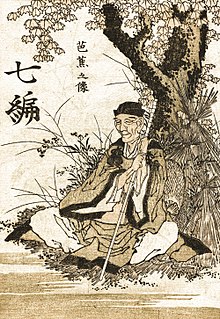Our website is made possible by displaying online advertisements to our visitors.
Please consider supporting us by disabling your ad blocker.
Oku no Hosomichi

Oku no Hosomichi (奥の細道, originally おくのほそ道), translated as The Narrow Road to the Deep North and The Narrow Road to the Interior, is a major work of haibun by the Japanese poet Matsuo Bashō, considered one of the major texts of Japanese literature of the Edo period.[1] The first edition was published posthumously in 1702.[2]
The text is written in the form of a prose and verse travel diary and was penned as Bashō made an epic and dangerous journey on foot through the Edo Japan of the late 17th century. While the poetic work became seminal of its own account, the poet's travels in the text have since inspired many people to follow in his footsteps and trace his journey for themselves. In one of its most memorable passages, Bashō suggests that "every day is a journey, and the journey itself home".[3] The text was also influenced by the works of Du Fu, who was highly revered by Bashō.[4]
Of Oku no Hosomichi, Kenji Miyazawa once suggested, "It was as if the very soul of Japan had itself written it."[5]
- ^ Bashō 1996b: 7.
- ^ Bolitho, Harold, in Treasures of the Yenching: seventy-fifth anniversary of the Harvard-Yenching Library, Chinese University Press, 2003, ISBN 978-962-996-102-2 p. 35.
- ^ Bashō 2000: 3. See also Norman 2008.
- ^ Heinrich, Amy Vladeck (1997). Currents in Japanese Culture: Translations and Transformations. Columbia University Press. p. 176. ISBN 9780231096966.
- ^ Norman 2008.
Previous Page Next Page
Oku no Hosomichi Catalan Oku no Hosomichi German Ο στενός δρόμος προς τα βάθη του βορρά Greek Oku no Hosomichi EO Oku no Hosomichi Spanish La Sente étroite du Bout-du-Monde French Lo stretto sentiero verso il profondo Nord Italian おくのほそ道 Japanese ვიწრო გზა შორეული ჩრდილოეთისკენ (ბაშოს ნაწარმოები) KA ਓਕੂ ਨੋ ਹੋਸੋਮੀਚੀ PA


